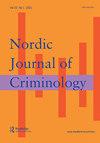Can social bonds and social learning theories help explain radical violent extremism?
Q2 Social Sciences
引用次数: 4
Abstract
ABSTRACT Radical violent extremism is a growing concern for the Nordic countries. In this interest, we examine how traditional criminological theories can help to explain the difference between violent and non-violent radical extremist individuals. We analyse the Profiles of Individuals Radicalized in the United States (PIRUS) dataset, with information on 2148 radical criminals in the United States, using a logistic regression, wherein violence was the dependent variable. The independent variables corresponded to aspects of social bonds and social learning. Results indicate that social bond theory has little predictive value for violence among radical criminals. Social learning perspectives were somewhat more predictive, with radical peers having a significant positive effect on the likelihood of radical violence. Socio-economic status, ideology and criminal history had significant positive effects as well. We conclude by exploring theoretical explanations, further research implications and discuss a Nordic version of a database.社会关系和社会学习理论能帮助解释激进的暴力极端主义吗?
激进的暴力极端主义是北欧国家日益关注的问题。在这个兴趣中,我们研究了传统的犯罪学理论如何帮助解释暴力和非暴力激进极端主义个人之间的差异。我们使用逻辑回归分析了美国激进化个人档案(PIRUS)数据集,其中包含美国2148名激进罪犯的信息,其中暴力是因变量。自变量对应于社会关系和社会学习的各个方面。结果表明,社会联系理论对激进罪犯的暴力行为预测价值不大。社会学习视角在某种程度上更具预测性,激进的同伴对激进暴力的可能性有显著的积极影响。社会经济地位、意识形态和犯罪史也有显著的积极影响。最后,我们探讨了理论解释,进一步的研究意义,并讨论了一个北欧版本的数据库。
本文章由计算机程序翻译,如有差异,请以英文原文为准。
求助全文
约1分钟内获得全文
求助全文

 求助内容:
求助内容: 应助结果提醒方式:
应助结果提醒方式:


